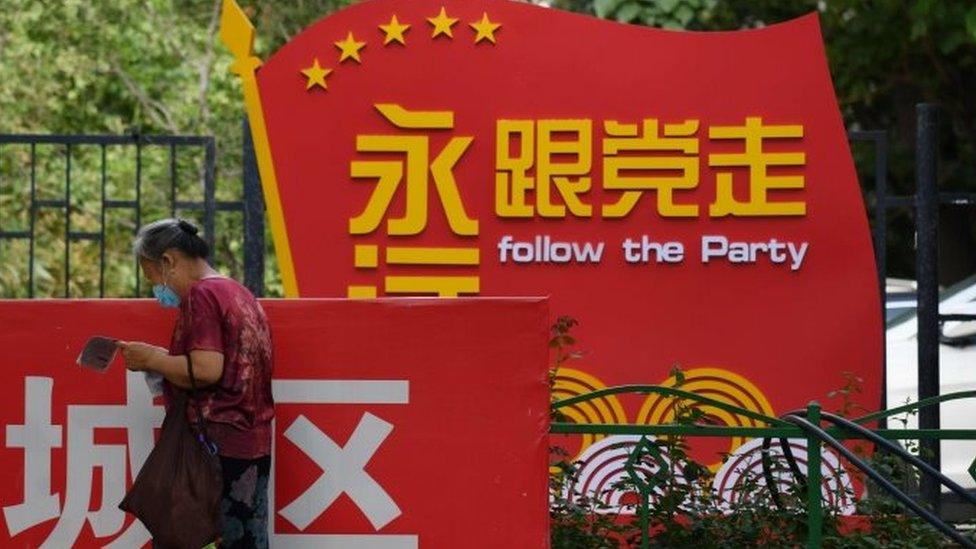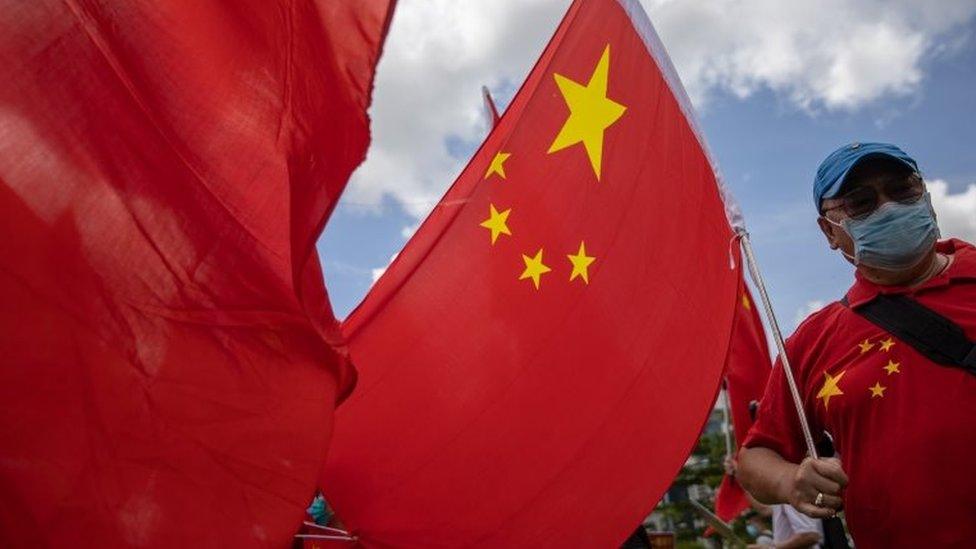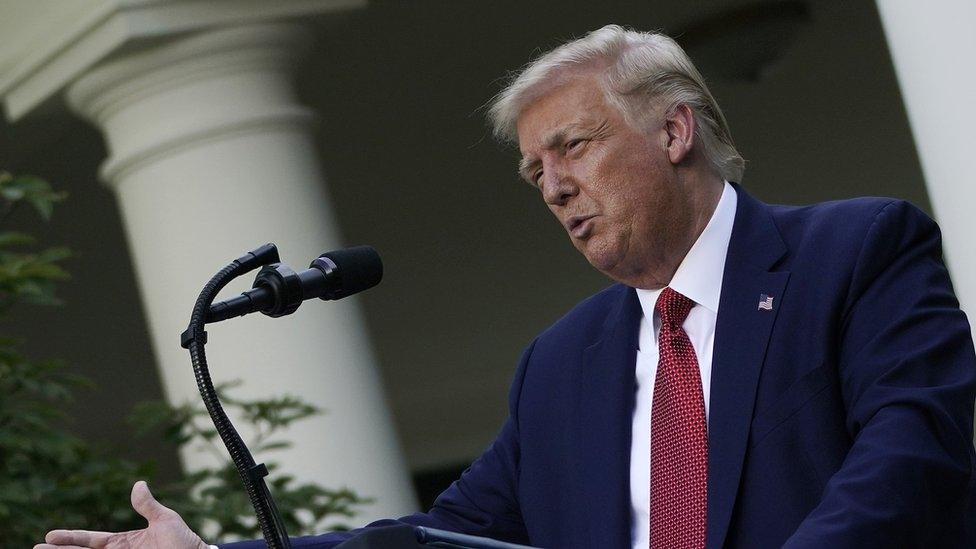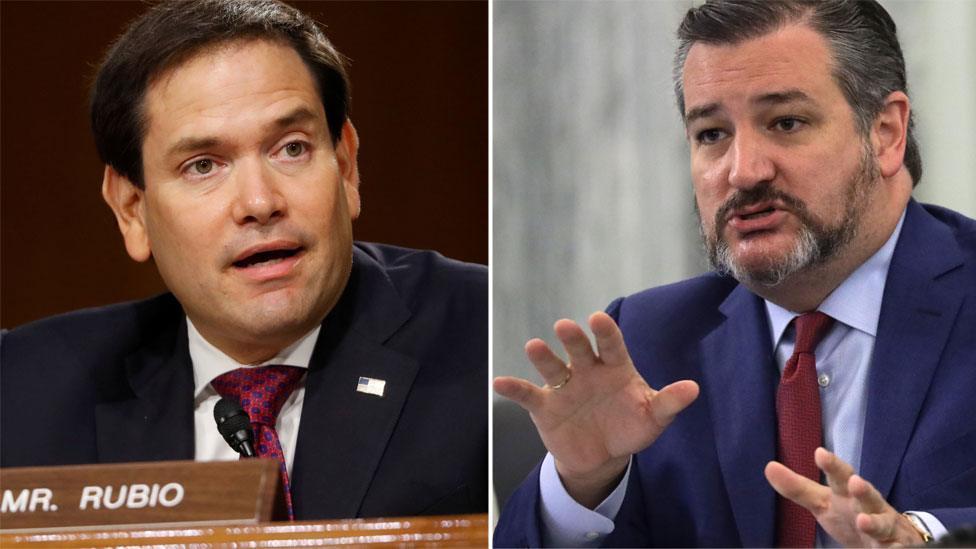China says a US travel ban on Communist Party members would be 'pathetic'
- Published

How the US could enforce a ban on 92 million members is unclear
China says any US travel ban on members of its Communist Party would be "pathetic", in the latest sharp exchange amid souring bilateral ties.
The New York Times had earlier reported the Trump government was considering the move, although it is still in draft form and could be rejected.
The Chinese Communist Party has 92 million members and how a ban would be enforced is uncertain.
US-China ties have become increasingly strained over a wide range of issues.
The US this week removed Hong Kong's preferential trade status, after China brought in a controversial new security law for the territory.
President Donald Trump has also criticised China over its handling of the coronavirus pandemic as well as its military build-up in the South China Sea, its treatment of Muslim minorities and massive trade surpluses.
Could there be a ban and would it work?
The article in the New York Times, external cites four people "with knowledge of the discussion".
The ban would stop members of the Chinese Communist Party and their families from visiting the US and could possibly expel some people already in the country, the paper says.
Officials at state-owned enterprises and of the People's Liberation Army could also be affected, although many would also be party members.
The Times itself says the plans have not been finalised and the president could dismiss them, and that the White House and the State Department had declined to comment.
The president could use the Immigration and Nationality Act, under which travellers from a number of mostly Muslim countries were banned in 2017.
The Times also points out that the US has no knowledge of Communist Party membership, making enforcement difficult, and that although three million Chinese visited the US last year, the numbers have evaporated amid the coronavirus outbreak.
The US currently bans arrivals of foreign nationals who have visited China in the past 14 days, external with "specific exceptions".
How did China react?
Chinese foreign ministry spokesperson Hua Chunying on Thursday responded to a question which said the Trump administration was considering a total ban on party members.
She said: "If that is true, I think that is utterly pathetic."

Pro-Beijing supporters in Hong Kong. The territory is one of the many issues straining US-China ties
More broadly she said: "We know that some in the US are oppressing China and bullying China. As an independent sovereign state, China must respond to the bullying practices and we must say no, we must... take reactive moves to it."
Analysts say any travel ban imposed by the US would almost certainly prompt retaliatory action on Americans visiting China.
The Communist Party is the country's sole, ruling political party. It controls the highest functions of government, through the National Congress, but also reaches far down into lower-level administration.
About 7% of the population are members of the party - loyal membership is essential for anyone who wants to climb the career ladder - whether in politics, business or even entertainment.
That even goes for people like e-commerce giant Alibaba's Jack Ma, telecomm company Huawei's founder Ren Zhengfei or celebrities like actress Fan Bingbing.
What else is hampering China-US ties?
Hua Chunying touched on a couple of other issues too.
Last week, the Trump administration announced sanctions against Chinese politicians who it says are responsible for human rights violations against Muslim minorities in Xinjiang.
Trump on Hong Kong: "Their freedom has been taken away"
Ms Hua invited US Secretary of State Mike Pompeo to visit Xinjiang to see for himself that there were no such violations.
She also said China would stick to the "phase one" trade deal it had reached with the United States earlier this year after a damaging tariff war.
Mr Trump said this week a "phase two" deal was in doubt because of China's handling of coronavirus, which he called the "plague".
The US officially withdrew last week from the World Health Organization, which Mr Trump had accused of being beholden to China.
His administration has also condemned China's military build-up in the South China Sea, where several countries have competing territorial claims. The US has accused China of bullying its neighbours.
China said it was not afraid of the threat of sanctions over the issue, accusing Washington of stirring up trouble and destabilising the region.
- Published15 July 2020

- Published13 July 2020

- Published13 July 2020
